Review of the Day: Wolf Hollow by Lauren Wolk
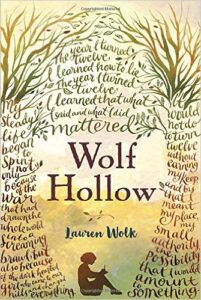 Wolf Hollow
Wolf Hollow
By Lauren Wolk
Dutton Children’s Books (an imprint of Penguin Random House)
$16.99
ISBN: 978-1101994825
Ages 10 and up
On shelves now.
I am not what you might call a very brave reader. This is probably why I primarily consume children’s literature. I might puff myself up with a defense that lists the many fine aspects of this particular type of writing and believe it too, but sometimes when you catch me in a weak moment I might confess that another reason I like reading books for kids is that the content is so very “safe” in comparison to books for adults. Disturbing elements are kept at a minimum. There’s always a undercurrent of hope running through the book, promising that maybe we don’t live in a cold, cruel, calculating universe that cares for us not one jot. Even so, that doesn’t mean that I don’t sometimes have difficulty with books written for, oh say, 10-year-olds. I do. I’m not proud of it, but I do. So when I flipped to the back of Wolf Hollow mid-way through reading it, I want to tell you that I did so not because I wanted to spoil the ending for myself but because I honestly couldn’t turn another page until I knew precisely how everything was going to fall out. In her debut children’s book, Lauren Wolk dives head first into difficult material. A compelling author, the book is making the assumption that child readers will want to see what happens to its characters, even when the foreshadowing is so thick you’d need a knife to cut through it. Even when the ending may not be the happy one everyone expects. And you know what? The book might be right.
It is fair to say that if Betty Glengarry hadn’t moved to western Pennsylvania in the autumn of 1943 then Annabelle would not have needed to become a liar later. Betty looks the part of the blond, blue-eyed innocent, but that exterior hides a nasty spirit. Within days of her arrival she’s threatened Annabelle and said in no uncertain terms that unless she’s brought something special she’ll take it out on the girl’s little brothers. Annabelle is saved from Betty’s threats by Toby, a war veteran with issues of his own. That’s when Betty begins a more concentrated campaign of pain. Rocks are thrown. Accusations made. There’s an incident that comes close to beheading someone. And then, when things look particularly bad, Betty disappears. And so does Toby. Now Annabelle finds herself trying to figure out what is right, what is wrong, and whether lies can ever lead people to the truth.
ADVERTISEMENT
ADVERTISEMENT
Right off the bat I’m going to tell you that this is a spoiler-rific review. I’ve puzzled it over but I can’t for the life of me figure out how I’d be able to discuss what Wolk’s doing here without giving away large chunks o’ plot. So if you’re the kind of reader who prefers to be surprised, walk on.
All gone? Okay. Let’s get to it.
First and foremost, let’s talk about why this book was rough going for me. I understand that “Wolf Hollow” is going to be categorized and tagged as a “bully book” for years to come, and I get that. But Betty, the villain of the piece, isn’t your average mean girl. I hesitate to use the word “sadistic” but there’s this cold undercurrent to her that makes for a particularly chilling read. Now the interesting thing is that Annabelle has a stronger spine than, say, I would in her situation. Like any good baddie, Betty identifies the girl’s weak spot pretty quickly (Annabelle’s younger brothers) and exploits it as soon as she is able. Even so, Annabelle does a good job of holding her own. It’s when Betty escalates the threat (and I do mean escalates) that you begin to wonder why the younger girl is so adamant to keep her parents in the dark about everything. If there is any weak spot in the novel, it’s a weak spot that a lot of books for middle grade titles share. Like any good author, Wolk can’t have Annabelle tattle to her parents because otherwise the book’s momentum would take a nose dive. Fortunately this situation doesn’t last very long and when Annabelle does at last confide in her very loving parents Betty adds manipulation to her bag of tricks. It got to the point where I honestly had to flip to the back of the book to see what would happen to everyone and that is a move I NEVER do. But there’s something about Betty, man. I think it might have something to do with how good she is at playing to folks’ preexisting prejudices.
Originally author Lauren Wolk wrote this as a novel for adults. When it was adapted into a book for kids she didn’t dumb it down or change the language in a significant manner. This accounts for some of the lines you’ll encounter in the story that bear a stronger import than some books for kids. Upon finding the footsteps of Betty in the turf, Annabelle remarks that they “were deep and sharp and suggested that she was more freighted than she could possibly be.” Of Toby, “He smelled a lot like the woods in thaw or a dog that’s been out in the rain. Strong, but not really dirty.” Maybe best of all, when Annabelle must help her mother create a salve for Betty’s poison ivy, “Together, we began a brew to soothe the hurt I’d prayed for.”
I shall restrain myself from describing to you fully how elated I was when I realized the correlation between Betty down in the well and the wolves that were trapped in the hollow so very long ago. Betty is a wolf. A duplicitous, scheming, nasty girl with a sadistic streak a mile wide. The kind of girl who would be more than willing to slit the throat of an innocent boy for sport. She’s a lone wolf, though she does find a mate/co-conspirator of sorts. Early in the book, Wolk foreshadows all of this. In a conversation with her grandfather, Annabelle asks if, when you raised it right, a wolf could become a dog. “A wolf is not a dog and never will be . . . no matter how you raise it.” Of course you might call Toby a lone wolf as well. He doesn’t seek out the company of other people and, like a wolf, he’s shot down for looking like a threat.
What Wolk manages to do is play with the reader’s desire for righteous justice. Sure Annabelle feels conflicted about Betty’s fate in the will but will young readers? There is no doubt in my mind that young readers in bookclubs everywhere will have a hard time feeling as bad for the antagonist’s fate as Annabelle does. Even at death’s door, the girl manages the twist the knife into Toby one last time. I can easily see kids in bookclub’s saying, “Sure, it must be awful to be impaled in a well for days on end . . . . buuuut . . . .” Wolk may have done too good a job delving deep into Betty’s dark side. It almost becomes a question of grace. We’re not even talking about forgiveness here. Can you just feel bad about what’s happened to the girl, even if it hasn’t changed her personality and even if she’s still awful? Wolk might have discussed after Betty’s death the details of her family situation, but she chooses not to. She isn’t making it easy for us. Betty lives and dies a terrible human being, yet oddly we’re the ones left with the consequences of that.
In talking with other people about the book, some have commented about what it a relief it was that Betty didn’t turn into a sweet little angel after her accident. This is true, but there is also no time. There will never be any redemption for Betty Glengarry. We don’t learn any specific details about her unhappy home life or what it was that turned her into the pint-sized monster she is. And her death comes in that quiet, unexpected way that so many deaths do come to us. Out of the blue and with a whisper. For all that she spent time in the well, she lies until her very last breath about how she got there. It’s like the novel Atonement with its young liar, but without the actual atoning.
Wolk says she wrote this book and based much of it on her own family’s stories. Her memories provided a great deal of the information because, as she says, even the simplest life on a Pennsylvanian farm can yield stories, all thanks to a child’s perspective. There will be people who compare it to To Kill a Mockingbird but to my mind it bears more in common with The Crucible. So much of the book examines how we judge as a society and how that judgment can grow out of hand (the fact that both this book and Miller’s play pivot on the false testimony of young girls is not insignificant). Now I’ll tell you the real reason I flipped to the back of the book early. With Wolf Hollow Wolk threatens child readers with injustice. As you read, there is a very great chance that Betty’s lies will carry the day and that she’ll never be held accountable for her actions. It doesn’t work out that way, though the ending isn’t what you’d call triumphant for Annabelle either. It’s all complicated, but it was that unknowing midway through the book that made me need to see where everything was going. In this book there are pieces to pick apart about lying, truth, the greater good, minority vs. majority opinions, the price of honesty and more. For that reason, I think it very likely it’ll find itself in good standing for a long time to come. A book unafraid to be uneasy.
On shelves now.
Source: Galley sent from publisher for review.
Filed under: Best Books, Best Books of 2016, Reviews, Reviews 2016
About Betsy Bird
Betsy Bird is currently the Collection Development Manager of the Evanston Public Library system and a former Materials Specialist for New York Public Library. She has served on Newbery, written for Horn Book, and has done other lovely little things that she'd love to tell you about but that she's sure you'd find more interesting to hear of in person. Her opinions are her own and do not reflect those of EPL, SLJ, or any of the other acronyms you might be able to name. Follow her on Twitter: @fuseeight.
ADVERTISEMENT
ADVERTISEMENT
SLJ Blog Network
Report: Newberry and Caldecot Awards To Be Determined by A.I.?
Trans Day of Visibility | Graphic Novels
Fifteen early Mock Newbery 2026 Contenders
When Book Bans are a Form of Discrimination, What is the Path to Justice?
Why I chose to write my new book as a graphic novel, a guest post by Nora Neus
ADVERTISEMENT




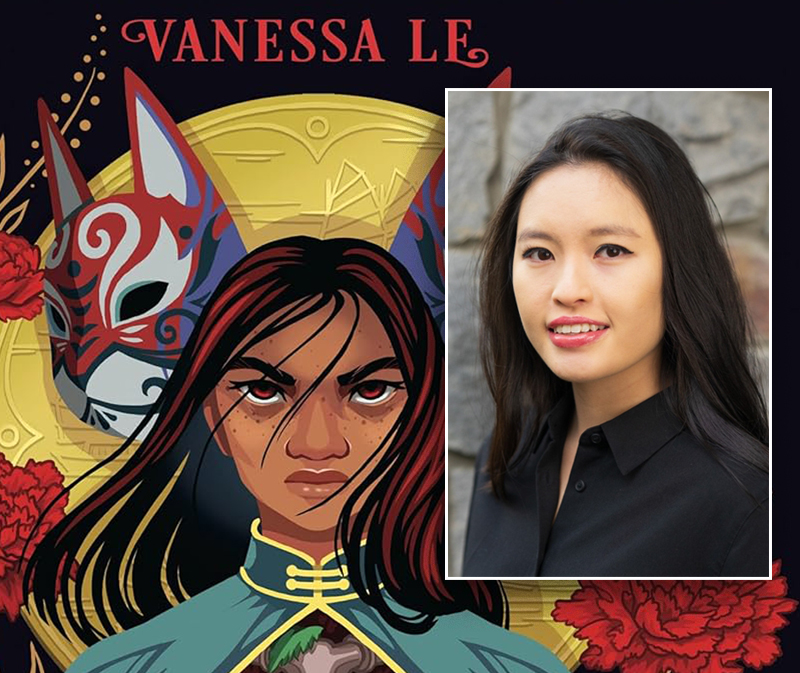
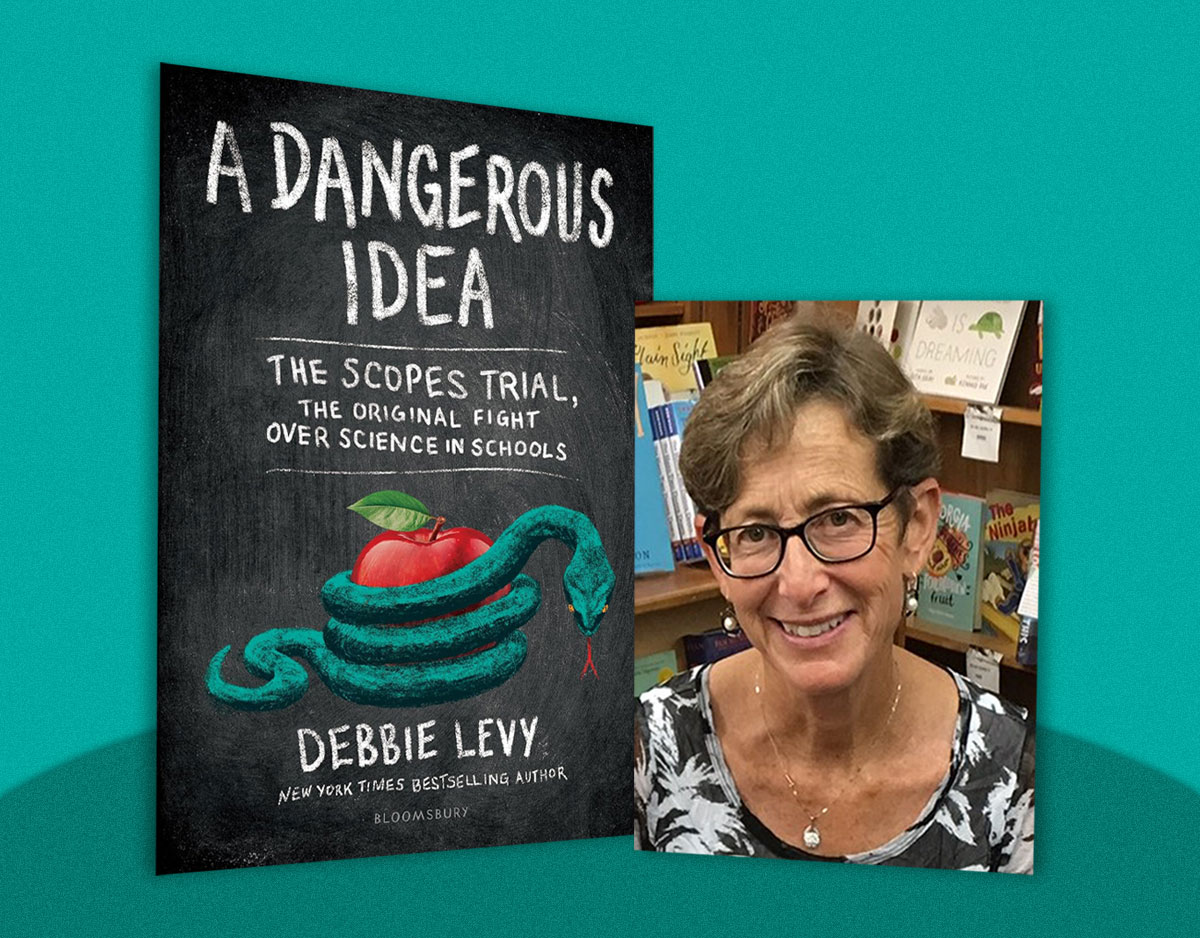
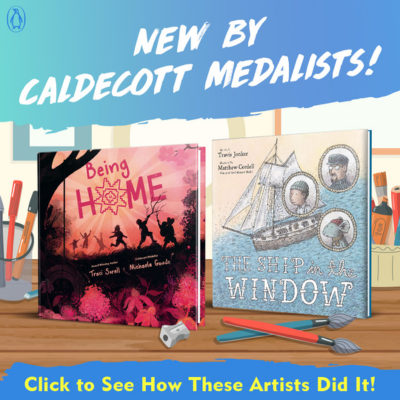
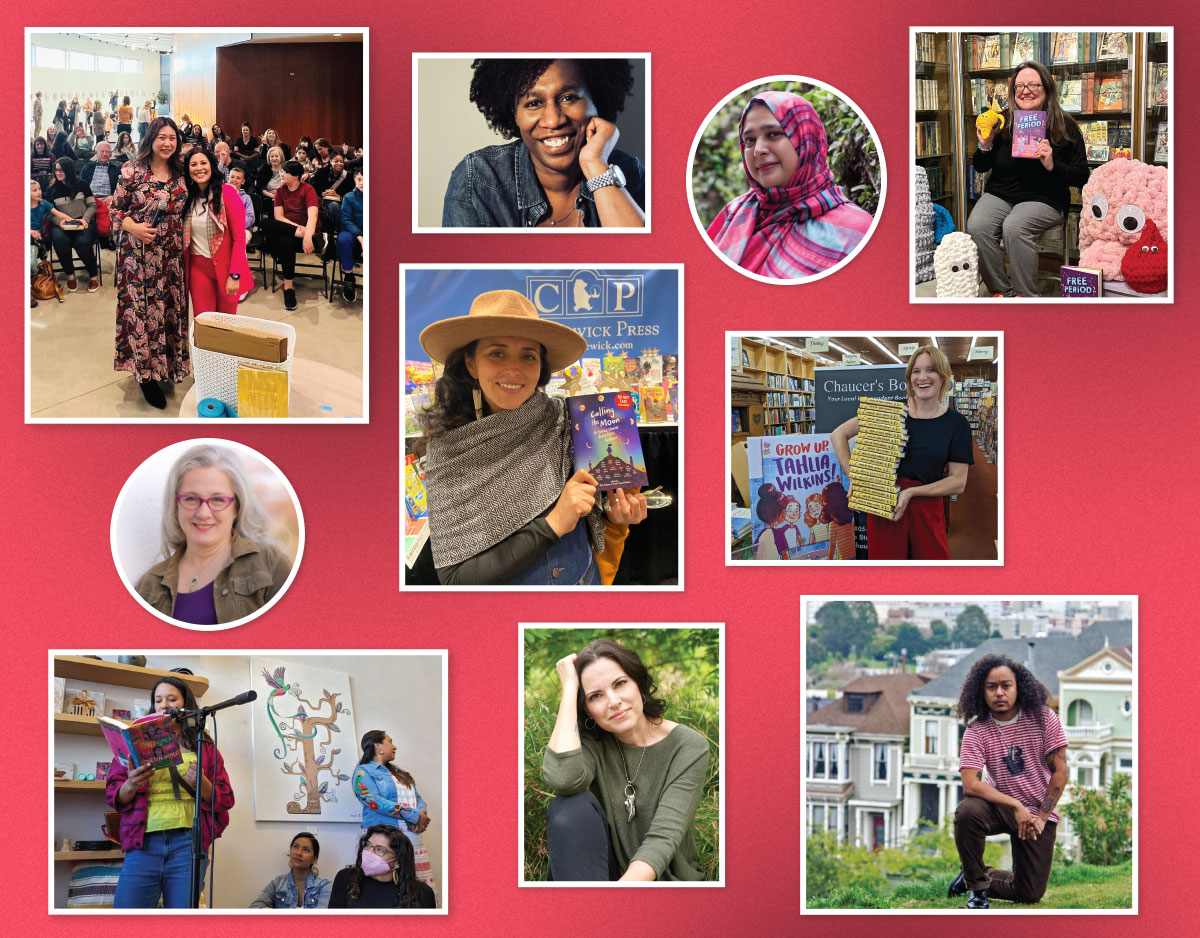
Betsy, your wonderful review made me pick up the book and read it immediately, and it was only your reassurance that kept me from turning to the ending myself. Betty is horrifying and remarkably real, perhaps because we see so firmly through Annabelle’s eyes. I was confused, though, because your review says that Annabelle disappears, which she does from time to time, but isn’t the book about Betty’s disappearance?
Ah! I corrected that on Goodreads and then plum forgot to correct it here. Thanks!
Betsy, I did the exact same thing with this book. The first third has such unrelenting spiraling menace, I wanted with all my own ten-year-old heart for Betty to just move away RIGHT NOW. Knowing that wouldn’t happen made me so anxious that I, too, had to turn to the back, just to alleviate the stress! I’m very interested to see how child readers respond. It’s a great book in so many ways — one of those books that stays with you, with beautiful writing and pacing, and memorable, engaging characters — but I did find myself wanting some leavening, more humor and light, through that dark first third. Betty is perhaps too real a villain — it’s hard to confront the possibility that some people are perhaps truly broken, not reachable by ordinary means or heal-able by good hearts. I loved that Annabelle, as you point out, did ultimately confide in her parents (before the place where I would have been yelling in my head for her to do so!) and that she had more gumption than the usual victim of bullying displays in children’s books. I’m so glad you posted your review, because I’ve been wanting to talk about this book!
Oo. “Gumption”. That’s the word I never got a chance to use in this review but should have.
I am always in favor of more humor. This book was actually originally intended to be for adults. With only a little adapting it became a children’s novel instead. I do wonder if the lack of humor is a characteristic remnant of its previous adult state.